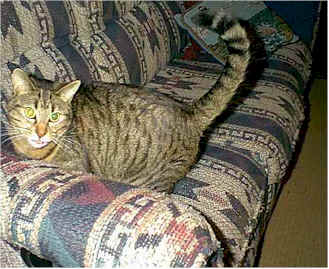|
Basic Cat Care
To Links
Cats and kittens are curious and playful. They can be
happy as an only pet, or live in a home with several other cats. They can also live in a
home with a dog, as long as they are introduced slowly, and carefully, and the dog
understands basic commands such as "NO" and "SIT".Cats can also live
in homes with birds, however you should never allow the cat alone with a bird who is out
of his cage, not even for a moment |
 |
Meet Dottie
Dottie is my cat. She loves to curl up on a blanket I keep on the end of the
couch for her. Dottie lives in the house all the time. She has little stuffed mice that
she loves to bat around and attack. She also been taught that Rockie, the bird, is
dangerous to her. She knows to avoid Rockie and his large beak. |
 |
 |
Cats make great house pets. They are clean and can remain safely in your
home without going outside. It is not safe for kitty outside. They cannot be restrained
like a dog, and can choke on a collar or be attacked by other cats or dogs. There are many
other dangers outside. |
HANDLING AND TRAINING
Handling: Kittens and adult cats should not be handled too much or too roughly. They
should be left alone when they are eating, sleeping, and using the litter box. The proper
way to hold your cat is by putting one hand under the front of the body (chest) and the
other hand under his back legs and holding him close to you.
Grooming: Brushing or combing your cat daily will help reduce hairballs from forming in
the stomach when he grooms himself. Use a soft wire slicker brush or wide-toothed comb for
long-haired cats. A rubber or bristle brush work well for short- haired cats.
Clawing: Provide a scratching post for your cat. When your cat scratches something that is unacceptable to you, a loud noise will usually distract him. Placing
double-faced tape on the area of furniture being clawed should discourage further damage.
Trimming your cat's nails weekly will also help. is unacceptable to you, a loud noise will usually distract him. Placing
double-faced tape on the area of furniture being clawed should discourage further damage.
Trimming your cat's nails weekly will also help.
Litterbox: Keep your cat's box clean by removing solid and moist waste with a scoop daily.
Wash the box weekly and refill with clean litter. If your cat
stops using the litter box, it means that the litter box needs to be changed, or the cat
is ill. If the box is clean, and has not been moved, a trip to the vet is needed to see if
kitty has an infection or blockage.
Playing: Always play with your cat or kitten with toys instead of your hands. Playing with
your hands will encourage biting and aggressive behavior. If your cat does bite, blow in
his face to distract him before pulling your hand away.
Social Training: Physical punishment is not effective with your cat. It may cause him to
be fearful of you or to misbehave when you are away. The basis for a good training program
includes rewarding good behavior. When unacceptable behavior occurs, distract him with a
loud noise or a squirt from water bottle. Do not interact with him directly as his
unacceptable behavior can become a way to get your attention. Instead, reward him with
attention, praise and maybe treats for good behavior only. |
The basics of healthy pet care are good diet and
exercise, but other steps are necessary too. Take your cat to the veterinarian shortly
after you get him, no matter what his age. Your veterinarian will tell you about necessary
care including vaccinations, which are given annually. Ask what the signs of illness are,
and how to get emergency help beyond regular office hours. When hurt or ill and not
treated promptly and properly, many cats (especially younger ones) can carry the effects
of their injury for the rest of their lives.
Take a fresh stool sample to your veterinarian at the time of your first visit. This can
be tested for internal parasites, and your kitten or cat can be treated as necessary. Over
the counter medications are not recommended.
Your vet can also tell you what shots your cat may
need, depending on its exposure to other cats and animals. |
| Once you have decided to open your home to a
cat, you should be aware that they have claws and like to scratch on wood and furniture.
This no longer needs to be a problem, as they make small clear covers that keep the
cats’ nails from doing any damage. They need to be replaced about once a month, as
the claws grow out. If your cat has had its claws surgically removed, you need to make
sure it never, ever gets outside. Without their claws they are not able to escape danger
by climbing up a tree. You need to make a commitment to keep that cat safe for the rest of
its life. |
 |
BRINGING YOUR NEW CAT HOME
You will need to take some time to introduce your cat to other family pets in order to
prevent fearful and aggressive problems from developing.
Confine the new cat to one room with his litter box, food, water, and a bed. Feeding the
present cats and the newcomers near either side of the door to this room will help them
associate something enjoyable with each other's presence. You can also switch sleeping
blankets between the new cat and resident cats to help them become accustomed to each
other's scent. Once the new cat is using its box and eating regularly while confined, let
it have free time in the house, while confining the other cats.
Successful introductions may take as long as three months, requiring a lot of patience.
Don't expect things to be perfect overnight! |
FEEDING
Kittens should not be taken from their mother until
they are seven to eight weeks old. If you acquire a motherless kitten younger than six
weeks old, consult a veterinarian about feeding.
Kittens have high caloric requirements because of their high energy level. Feed kittens
under six months old canned kitten food three to four times daily, removing any uneaten
food after ten minutes. Overfeeding can result in diarrhea and or vomiting.
At about six to eight months of age, reduce canned feeding to two times daily.
Dry kitten food and fresh water should be available at all times for kittens of all ages.
When your kitten reaches one year of age, gradually change to adult food by mixing 1/4
adult food with 3/4 kitten food. Gradually increase the adult food to 100% over a five to
ten day period.
Avoid generic cat food and do not feed dog food (cats need more protein and amino acids
than dog food provides).
Cats enjoy a variety in their diet. In addition to daily dry food, you may want to feed
canned (moist) food periodically.
Feed moist food at room temperature and store uneaten food in a glass container in the
refrigerator.
Don't let table scraps make up more than 50% or your cat's diet. Avoid uncooked food, and
never give your cat bones.
Milk can cause diarrhea and should be avoided in cats and kittens of all ages.
Your cat or kitten requires fresh drinking water in a clean glass bowl at all times.
Feed your cat what he likes. The "best" food will do your cat no good if he will
not eat it. |
 |
Do not give the cat chicken bones as they can choke
them. Also, chocolate is poisonous to cats. Cats and Dogs are both attracted to Antifreeze
from the car. This is extremely poisonous to them. |
The importance of neutering cannot be
over-emphasized. Neutering is a generic term referring to the surgeries performed by your
veterinarian so that your cat will not breed or have kittens. The surgery is commonly
called "spaying" for a female and "neutering" for a male. By neutering
your pet, you are being a responsible pet owner in preventing the birth and resulting
death of millions of cats because there are not enough homes for all of them.
In addition, your pet will be healthier and happier once neutered!. Neutering will also
reduce a cat's urge to roam, help eliminate behaviors such as spraying and crying, reduce
the risk of certain types of cancer, and reduce aggressiveness. Male and females can be
neutered as early as four months. |
|
 Back to Home Page
Back to Home Page![]()